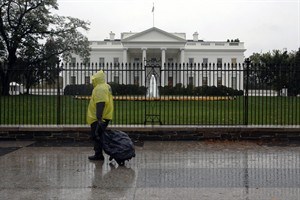Christopher S. Rugaber, Martin Crutsinger

In this Monday, Oct. 29, 2012, photo, a lone man wearing a rain pouch walks past the White House in Washington, Monday, Oct. 29,2012, during the approach of Hurricane Sandy. Whoever wins the U.S. presidential election will likely struggle to manage the biggest economic threats he'll face. That's the cautionary message that emerges from the latest Associated Press Economy Survey. (AP Photo/Jacquelyn Martin)
October 29, 2012 - 2:38 PM
WASHINGTON - Airlines cancelled thousands of flights and stranded travellers. Insurers braced for damages of up to $5 billion. Retailers expected shrunken sales.
Hurricane Sandy is causing disruptions for companies, travellers and consumers. But for the overall economy, damage from the storm will likely be limited. And any economic growth lost to the storm in the short run will likely be restored once reconstruction begins, analysts say.
Preliminary estimates are that damage will range between $10 billion and $20 billion. That could top last year's Hurricane Irene, which cost $15.8 billion.
If so, Hurricane Sandy would be among the 10 most costly hurricanes in U.S. history. But it would still be far below the worst — Hurricane Katrina, which cost $108 billion and caused 1,200 deaths in 2005.
"Assuming the storm simply disrupts things for a few days and it doesn't do significant damage to infrastructure, then I don't think it will have a significant national impact," Mark Zandi, chief economist at Moody's Analytics, said Monday.
The economic impact could be more severe if the storm damages a port or a major manufacturing facility such as an oil refinery, Zandi noted.
Here's how the storm has begun to affect areas of the economy:
— Air travel in the U.S. Northeast is all but stopped for at least two days. Airlines cancelled more than 10,000 flights for Monday and Tuesday from Washington to Boston. The disruptions spread across the nation and overseas, stranding passengers from Hong Kong to Europe. Carriers could suffer a short-term hit to earnings as they spend more to shuffle crews and planes.
— The nation's major retailers are expected to lose billions of dollars, and the losses could extend into the crucial holiday shopping season. Sales at department stores, clothing chains, jewelers and other sellers of non-essential goods are expected to suffer the most.
— Power outages and disruptions in major East Coast cities "may take a toll on demand unlike anything we have seen before," Phil Flynn, a senior market analyst for Price Futures Group, wrote in a report. Some of the biggest oil refineries in the Northeast were closed, and others were running at reduced capacity. As businesses closed and drivers staying home, demand for gasoline was expected to fall.
— The cost to insurers is expected to rival the insured damage from Hurricane Irene last year. Damage from Irene cost insurers roughly $5 billion, according to Sterne, Agee & Leach Research. Because the storm is hitting a highly populous region, with "one of the highest concentrations of wealth in the world," the damages are likely to run into the billions, say analysts at Morgan Stanley.
Hurricanes, like other disasters, can cause big losses but also big spikes in economic activity, once homes and buildings are rebuilt or repaired. And Americans may spend more before the storm when they stock up on extra food, water and batteries. Spending can also rise afterward as households restock.
The overall economy expanded at an annual rate of 2 per cent in the July-September quarter. Zandi said he isn't changing his forecast for similar growth in the current October-December quarter of 1.9 per cent.
Economic activity in October and November might slow if factory output declines and some workers are laid off temporarily and seek unemployment benefits. But the economy could strengthen in December as companies rebound.
CoreLogic, a private data provider, estimates that there are 284,000 homes worth about $88 billion in the hurricane's path.
The airline cancellations have already surpassed those from Hurricane Irene last August and are on par with those from a major snowstorm that socked the East Coast early last year.
The Airports International Council, a trade group for airports worldwide, said that even if storm damage is minor, it could be a week before operations are normal at major East Coast airports.
___
AP Business Writers Christina Rexrode, Anne D'Innocenzio and Samantha Bomkamp in New York and Joshua Freed in Minneapolis contributed to this report.
News from © The Associated Press, 2012